The two Rillan Hill men tried for murder in connection with the May 4, 2017 shooting deaths of brothers Danroy Cozier, a 26-year-old police constable, and Nicholas Cozier, 19, have been found guilty.
A 12-member jury deliberated for four hours and 37 minutes before returning the verdict on Friday at High Court No. 1, in Kingstown, where Justice Brian Cottle presided over the three-week trial that ended a few moments ago.
The sentencing has been set for July 14. The men have been remanded into custody until then.
The two men, Schemel “Jacket” Dunbar, 34, and Kendine “Hoodie” Douglas, 36, were charged along with Richard “Carib” Francis, a van driver and former police officer, of Layou.
Midway through their first trial in December, Francis pleaded guilty and the court ordered a retrial of his co-accused.
Friday’s verdict ended a three-week trial in which the DNA of one of the murdered men was found on a cell phone that police took from Dunbar, who claimed that he was not involved in the killing.
Dunbar and Douglas chose not to testify on their own behalf and Dunbar called no witnesses.
Douglas, however, called as witnesses his mother, Jennifer Douglas, as well as Jomo Thomas, a lawyer who walked out on him during his first interview with police, lawyer Ronald Marks, who represents Francis, and Dr. Nadja Peters, who is assigned to Milton Cato Memorial Hospital.
His defence was largely that he was beaten by police and promised something to give to the police the statements he gave in the presence of Thomas and later in the presence of his (Douglas’) sister, Andine Douglas.
Unlike his co-accused, Dunbar did not give a blood sample for DNA testing, as police had requested.
The prosecution’s case was that on April 26, 2017, there was an accident involving Danroy and Francis’ vehicles. Francis accepted liability and offered to repay Danroy.
However, at some point, Francis hatched a plan to kill Danroy. Dunbar, who was contracted to do the dirty deed, roped in Douglas to be part of that purpose.
They set out on May 4, 2017, to action their mutual plan and picked up Dunbar and Douglas in Rillan Hill and later picked up the brothers at the Sion Hill intersection, drove to Arnos Vale then on to Sion Hill, along the road running along the Technical College.
When they got to the area of the decommissioned incinerator at Sion Hill, Francis turned up the music in the van and Dunbar opened fire, killing the brothers.
The court heard that each of the Cozier brothers received two gunshots to the head. After being shot, Nicholas’ leg struck a window of the van, causing it to shatter.
“Now, you are not shooting somebody twice in the head because you have an intention to injure them. You only shoot someone in the head, twice at that, when you have a specific intention to kill,” prosecutor Richie Maitland, senior Crown counsel in the office of the Director of Public Prosecutions, told the jury on Wednesday, as he presented the Crown’s closing argument.
The other members of the prosecution’s team were Director of Public Prosecutions Sejilla McDowall and Crown counsel Renee Simmons.
Carl Williams represented Dunbar and Grant Connell appeared for Douglas.
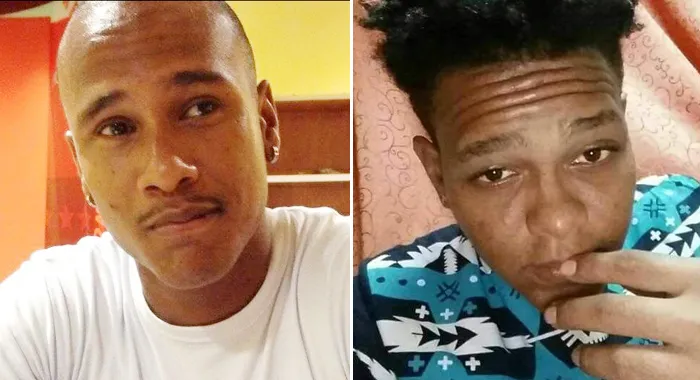
Lawyer walks out on client
In summarising the evidence for the jury on Friday, Justice Cottle noted that police conducted two electronically-recorded interviews with Douglas.
In the first interview, Thomas was present and the lawyer asked Douglas if he understood the advice he had given him (Douglas).
Douglas responded “yes” but as the interview progressed he continued to respond to the questions that police asked him.
Thomas reminded him of his advice and told him that he should protect himself by not answering the questions.
He told Douglas that he was not going to repeat this again.
Detective Inspector Atland Browne, the lead investigator and one of the officers conducting the interview, told Douglas the interview was an opportunity to give an account of where he was between 8 a.m. and 6 p.m. on May 4, 2017.
Thomas told Douglas, “Before you answer that, would you like me to leave the room?”
Douglas said “no” and Browne asked him if he wanted to continue with his lawyer and he said, “yes”.
Browne asked Douglas how he was dressed on the day and Douglas described his clothing.
He further told the officers he was at a shop with Dunbar. The officers asked Douglas if he knew Dunbar, at which point Thomas got up and left the room.
He put his head back through the doorway and told the officers that he was letting them know that he was not returning.
Shortly after this, the interview was terminated.
‘shots start to beat in the van’
The police conducted another interview with Douglas in the presence of his sister, Andine Douglas.
The officers told the accused man of his rights.
In that second interview, Douglas told police that Dunbar invited him to go on a scene and he agreed to go.
He said that Francis picked them up in a van at Rillan Hill and they drove to Sion Hill and waited there while Francis went to call the man — referring to Danroy.
Douglas explained that Francis had some money for Danroy but said he could not “pay them kinda money dey” and told Dunbar that it was best that they just kill Danroy “and done”.
Danroy and his brother arrived and Francis and Danroy were speaking outside the vehicle for a while before they all boarded the van.
Douglas told police that they drove down to Sion Hill and when they got to the area of the former incinerator “the big man and them turn up the music loud so that nobody can’t hear.
“Then shots start to beat in the van,” Douglas said, adding that Dunbar was the one “beating” the shots.
He said Dunbar gave “the first man two in his head — the one who sitting at the conductor seat”, referring to Nicholas.
Douglas said that Dunbar shot Nicholas from in front.
“Be time the man look round, he offload. Blood then start to spit up,” Douglas said, adding that that is how blood got onto his pants.
Douglas said that there was “one shot that went through mister head and hit the van and made a hole”.
He told police that after the shooting, they drove to an area where a house was under construction and they saw people there. Therefore, they went to Sion Hill Bay and disposed of the bodies there.
Douglas further told the police that he went with Francis to clean the van.
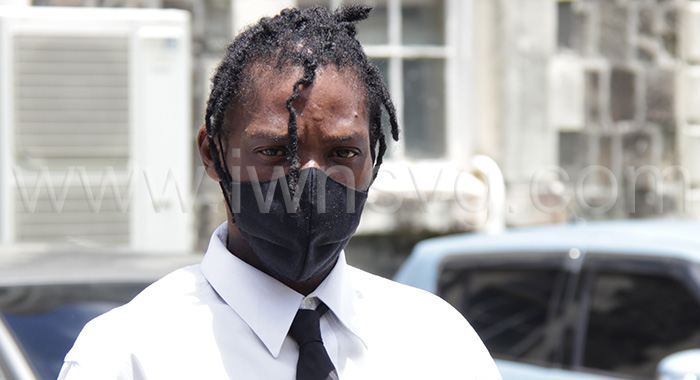
Dunbar denied involvement
Meanwhile, in his interview, Dunbar, who was unrepresented, told police that he had more than one lawyer but did not need one “right now” because he could handle himself and would cooperate.
The officers told him about the allegations and asked him where he was on the day of the killing.
Dunbar said, “Rillan”.
When officer asked him if he did not leave home, Dunbar said no but later said he left home and went on the “block” (street corner).
The police officers asked him if he and Francis were friends and Dunbar said, “Not like that”, adding that he knows Francis as a bus driver.
Dunbar told police that he knew Francis had a van but did not know the number but that it was red and white.
In the interview with Dunbar, police gave him details of the allegation of his involvement in the murders.
Dunbar told officers that he was nowhere there.
He said he could not remember if he had ever ridden in Francis’ van and that he was not aware that the police officer who was killed had been involved in an accident with Francis’ van.
Dunbar denied telephoning Francis to tell him he (Dunbar) had killed two men and, therefore, Francis had to pay him double.
He told police he knew Douglas and they were on the block, but Douglas had arrived shortly before the police arrested them.
Dunbar said that police told him that he was wanted and he decided to cooperate.
He told police that he could not recall his telephone number because he had recently gotten it.
He also said he had not gotten any calls from Francis.
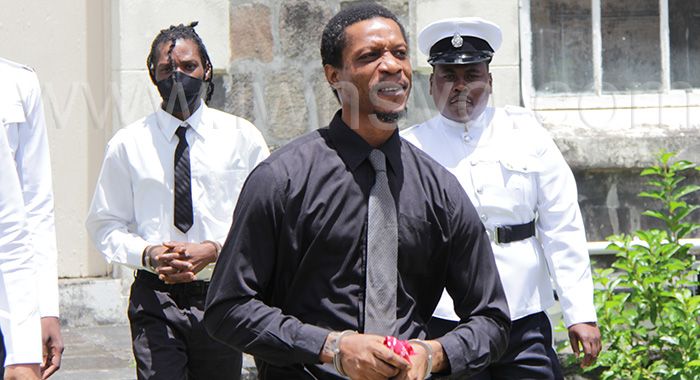
‘$1,500 was the value of a human life’
The court heard that while Dunbar claimed that he only knew Francis as a bus operator in the area, phone records showed that there had been 128 phone calls, of varying durations, between them.
The prosecution presented Francis as the mastermind of the plan, Dunbar as the hitman and Douglas as his wingman.
But they argued that Douglas was integrally involved and asked the jury to find that the Coziers were murdered as part of a joint enterprise and that Douglas was just as guilty as Dunbar, who they argued pulled the trigger.
Young men returning from fishing around 1 p.m. on May 4, 2017 found the Coziers’ bodies on the beach at Sion Hill and the trio were arrested hours later.
“What is the value of a human life? A reasonable person would agree that a human life is invaluable. But for Schemel Dunbar and for Kendine Douglas, they put a price on the head of Danroy Cozier because Richard Francis aka Carib wanted him dead,” Maitland said as he opened his closing address.
“For these two accused men, $1,500 was the value of a human life,” he said, noting that it was less than the cost of repairing the older Cozier’s vehicle, and less than the cost of a couch or modern stove or fridge.
“Far worse when you consider the two defendants took two lives because Danroy was accompanied by his younger brother on that day,” Maitland said.
He said that because Danroy left from his family home, he was accompanied by his brother, and could very well have been accompanied by his wife and child, had he left from his matrimonial home.
The prosecutor noted that Dunbar, Douglas and Francis were arrested the very day of the killings.
The two Rillan Hill men were arrested near a shop in their South Leeward village and Francis at his home in Layou, a Central Leeward town.
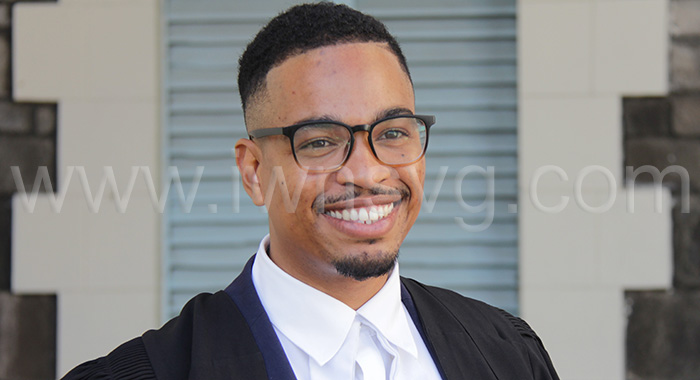
At the time of the arrests, Douglas had a bag of bloody clothes and police took from Dunbar a cell phone and he confirmed that it was his number.
Francis and Douglas cooperated with police and made separate visits to the scene where the bodies were found and they each pointed out the same things to police.
Both of them told police where Francis had picked up Dunbar and Douglas, Maitland pointed out, adding that the jury also saw video footage of Francis’ bus at Sion Hill, where the bodies were dumped.
The prosecutor noted that Francis and Douglas showed where the Coziers were picked up at the Sion Hill intersection, where each person sat in the bus, the route they took, the area where the fatal shots were fired, where they first attempted to dump the bodies, the route they took to Sion Hill and to Layou, where Dunbar exited the van at Rillan Hill, where Francis went to Palmiste mountain in Layou to wash the blood out of the van, and where Douglas returned to Rillan Hill.
Maitland pointed out that in his second interview with police, Douglas said that Francis, who was travelling from Kingstown, picked up him and Dunbar in Rillan.
Dunbar asked Douglas to accompany him “on a scene”, Maitland cited Douglas as saying, adding that Douglas knew that the “scene” was to kill a police man who Francis owed money but who they had decided to kill instead.
Douglas indicated that he was present when Francis was talking to Dunbar about picking up the policeman and the other deceased.
Douglas said he saw Francis exit the van when the police officer and a youth arrived and saw the men enter the van.
According to Douglas’ account, he was sitting behind Francis, the driver, Danroy was sitting in front, Nicholas was at the conductor seat, and Dunbar to the back of the van.
He said that Nicholas’ blood got onto him (Kendine) when he was killed.
Anonymous witness
At the trial, an anonymous witness testified that in prison, Dunbar detailed the murders to him.
In seeking to establish joint enterprise, Maitland noted that there was the evidence of Shakita Cozier, Danroy’s widow, who indicated knowledge of an accident and discussion between Danroy and Francis.
Detective Constable Roland Dascent took photos of Cozier’s car, establishing that there was an accident.
Danroy’s sister saw the name “Richard” calling on Danroy’s phone and he thereafter left, saying he was going to collect the money.
AB, the anonymous witness, testified that Dunbar told him in prison that he and Douglas were in the back of the van.
Maitland said there are many reasons why a witness may wish to be anonymous. He said the Crown had deliberately not led any evidence about purpose or reason, adding that the jury may form its own opinion about this.
He, however, noted that the law puts in place a procedure through which an application may be made for a person to give evidence anonymously. He pointed out that the application succeeded and AB was able to give evidence anonymously.
The prosecutor further noted that AB’s witness statement was available, with certain portions blacked out to protect his identity.
He noted that AB’s testimony was not information that the police gathered.
“This was information which was provided by AB that cannot be a coincidence when you consider that it gels perfectly with the evidence ultimately given by Kendine Douglas.”
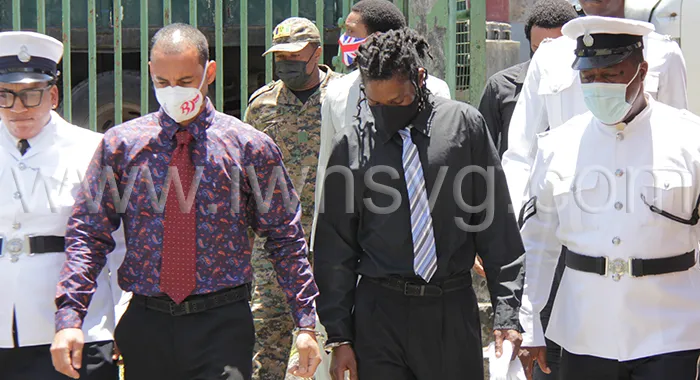
The prosecutor noted that in his evidence, AB, recounting what he said Dunbar told him in prison, said that Dunbar was “strap up” (armed) and when they got to Sion Hill, Dunbar eased up from where he was hiding at the back of the bus.
Dunbar started shooting the police man and his brother while they were coming down the highway.
“He shoot the younger brother. That the younger brother was so hard to dead that he (Nicholas) start to kick up and he kicked out the glass in the bus window,” Maitland recounted.
Maitland said that the physical evidence was that the glass in the bus window was in fact shattered.
AB further testified that Dunbar told him that Douglas was stupid to go up by the river and still bring back the bloody clothes.
“That is probably exactly what somebody in Jacket’s position would say,” Maitland told the jury and invited them to find that the anonymous witness was truthful and that Dunbar did say these things to him.
The witness further said that Dunbar had told him that nobody was going to stand up in a box against him and that he was trying to get some chemicals to kill Francis and Douglas.
Maitland said there was no evidence that AB was forced, promised anything or rewarded for giving the statement.
He reminded the jury that when AB was asked why he came forward, he said that he did not like what happened and two men did not have to lose their lives.
Maitland commented:
“Now, imagine, this is a man in jail for a robbery offence and he … being a criminal himself was so affronted by what he heard from Jacket concerning what Jacket did, that he, a criminal in jail, decided to come forward to tell the court.”
Maitland said that Jamaicans have an expression that he likes, referring to when someone sicks John Crow (vulture) stomach.
“When something sick John Crow stomach, that is to tell you the level of disgust that it causes, that it inspires. A criminal in a jail cell was so grossed out by what another criminal told him that he felt the impetus, he felt the impulse to go to the police and tell them ‘this is what I heard’.”
Maitland said that a spent shell was recovered from the bus and AB in his evidence said that when Dunbar sent the men up to Palmiste to clean the van, among other things, they had to remove a bullet from the deck.
“A bullet could have only ended up in the deck at the front of the vehicle if it was fired from behind –from the back.”
The prosecutor said that AB made a mistake about the date on which he gave the statement, saying it was on May 7, 2017.
However, Browne said he saw a statement dated June 2017 and he electronically recorded an interview with AB in September 2017.
Maitland acknowledged that AB has a conviction, adding that the anonymous witness admits his conviction for robbery and said that he knows that robbery is wrong.
“But what is clear is that he has no conviction for deceiving people,” the prosecutor said.
“We are talking here about men taking life. Any man with a conscience, a thief man or not, can find the action of the accused man abhorrent. There is no real reason why AB’s statement should not be believed simply because he himself was in jail for robbery.”
‘a vivid picture of what exactly occurred’
Maitland told the jury that the prosecution’s case paints “a vivid picture of what exactly occurred”.
He urged the jury to disregard the defence’s tactics, noting that the Crown had said that the defendants had nothing to prove.
“But oftentimes, those who have nothing to prove will seek to confuse and so you have to arm your minds against this confusion,” the prosecutor said.
He said there was no need to look into a crystal ball to see that the defence simply could not stand up.
He said that it is true that the police did not meet Douglas directly in Dunbar’s presence, in that they were not standing side-by-side.
However, the police said the two men were just about 15 feet apart when they were intercepted. He said the jury might consider that this is not a coincidence when they consider Douglas and AB’s statements.
“How silly is it of Douglas to return with the bloody clothes, including Jacket’s sneakers or a similar description of the sneakers which Jacket said was lost in the bushes … Kendine, when he was found with the bloody bag, was found with the sneakers matching the description.”
‘police force not on trial’
The prosecutor also pre-empted suggestions by the defence that police had beaten Douglas, therefore he gave them a statement. Maitland said that the prosecution denounces police beating, and, like the society, finds it abominable.
“We do not make light of this. You, as a jury, may have seen instances of police brutality yourself,” he said, adding that there might have been a lot of anti-police comments in the media because of this behaviour.
He noted that the jury, however, had taken an oath.
“The police force is not on trial… Do not lose sight of the fact that it is these two men who are charged for the death of these two men,” he said.
He told the jury that when considering whether there was a beating, do so in light of what Douglas has said and whether his statement was voluntary.
He asked the jury to consider what they saw in the interview.
Maitland noted that Browne read Douglas his rights. Further, before the first interview, Thomas had the opportunity to speak with Douglas briefly, in private, and advised him what to do when they went into the interview room.
Thomas testified that contrary to his advice, Douglas decided that he wanted to speak.
“Whether or not he was beaten, there was no evidence that he was beaten in close proximity to the interview.”
He said safeguards were taken in that the police called Douglas’ sister to be in the interview room with him.
He said that the defence may want to focus on the alleged misconduct of a “mystery policeman” but he urged the jury to focus on the key facts.
“None of the police officers integrally connected with the investigation were accused of beating Kendine Douglas,” the prosecutor reasoned.
He noted that there was no medical evidence that Douglas was beaten, no evidence of injury to his ribs, as his sister alleged.
“Importantly, there is no evidence from Kendine Douglas himself, or any witness who can give details of a beating, if, indeed, the police had beaten Kendine. If the police had beaten him, wouldn’t it not have been reasonable for him to make an indication, to put his case that this is what happened?”
The prosecutor noted that in the video interview, Kendine did not say that he was beaten, even at the end when the police officer asked him if he wanted to add anything.
Thomas also did not say in the interview that Douglas had said that he was beaten.
“It is clear from Kendine’s interview that he was not beaten to give the statement … in which he details everything. You have seen on video a man who was ready to clear his conscience after having a gruesome act in joint enterprise with Schemel Dunbar.”
He said that the defence could argue that Browne had promised Douglas that he would go home, adding that the defence would try to use minuscule details from the interview to insinuate that there was a promise made.
Maitland noted that Browne denied that a promise was made to Douglas. Douglas’ sister could not say that her brother was promised anything. Thomas did not say that Douglas was promised anything. However, Douglas’ mother claimed that he was promised that he would go home.
“But this is what she now says in 2023 for an incident in 2017. Her last-ditch efforts to assist her son.”
Maitland, who is originally from Grenada and has been working in St. Vincent and the Grenadines for over a year, said there is an old Vincentian saying about people “taking tricks to make luck”. He said this is what the defence was doing, suggesting that there was a promise so that the jury disregard the truth of what was in Douglas’ statement.
“He may have been beaten. If so, that is objectionable. Is it true what he said in his statement? The Crown said it is true.”
Maitland told the jury to consider whether Browne, with over 30 years of policing experience, having regard to the facts that were before him, would have been justified in sending Douglas home.
“That is absurd! Why would they send him home? To do what? To carry on like nothing ever happened?”
Maitland said that when Browne said he had to consult the authorities, he was simply speaking about standard police procedure and not a promise.
He said that Browne clarified in his statement that he was waiting on the DPP to indicate whether to charge and what charges to lay.
The prosecutor noted that it was interesting that Browne’s supervisors, Deputy Commissioner of Police Frankie Joseph and Commissioner of Police, Colin John, were not called to indicate that they knew of any promise. He reiterated that Douglas did not say that a promise was made to him.
“Who made the promise? When the promise was made? In whose presence was the promise made?” he said, adding that the defence may seek to make insinuation by the mere mention of the word “promise”.
“What was the context of that?” Maitland said, adding that Douglas himself did not say that he was promised anything.
‘charged after being in custody for over 48 hours’
He said that the defence would make much of the fact that Douglas was charged after being in custody for over 48 hours.
Maitland noted that the judge is the one to guide on the law, but added that the law does not say that an accused must be charged after being in custody for 48 hours.
“The law speaks to them being brought before a court within 48 hours or when practicable to be brought to court on the next practicable day.”
He noted that the electronic interview was on a Saturday, a day on which the magistrate’s courts are not open.
The court sat on a Monday and they were brought there on a Monday, Maitland explained, adding that in doing so, the police followed the law.
“Don’t be confused by the sand being thrown in your eyes about 48 hours,” he said. “Go back to the central issue of whether you find that the statement was voluntary.
He said that the defence might argue that the police did not ensure that Douglas had a lawyer in the second interview, that they didn’t give Andine Douglas sufficient time to speak with her brother before the interview, and that Andine had spoken about the beating before the interview.
But he noted that during the interview, Thomas walked out on his client “and theatrically came back in an opened the door and said, ‘I am not coming back.’”
He asked whether the police were expected to chase down Thomas, who had said that he was not coming back.
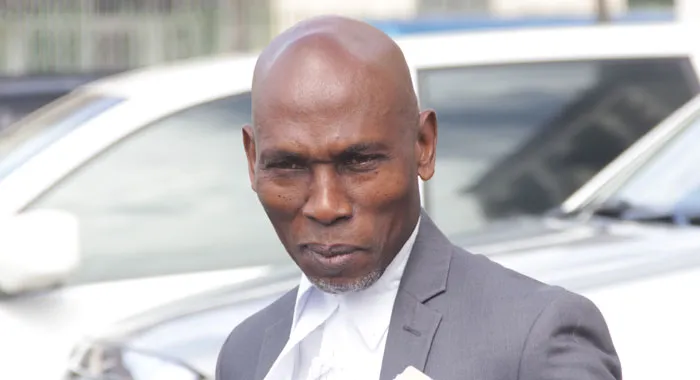
Maitland said Douglas continued to speak freely in the second interview, as he had done during the first interview, when his lawyer had told him to exercise his right to be silent.
“He wanted to talk. He had something on his conscience that he needed to get off and we heard exactly what it was that he wished to speak about.”
The prosecutor noted that in the second interview Douglas did not say that he was denied a lawyer; that he wanted a lawyer; or that he was forced to do the interview with his sister, as opposed to a lawyer.
Maitland further noted that Douglas did not deny that he requested that his sister be present in the interview, that he was reminded about the legal presentation to which he was entitled. He pointed out that Douglas also did not say he was waiting for Thomas to return.
Maitland asked the jury to believe that when Douglas gave the second statement, he was speaking the truth.
“The defence knows, however, that when you talk the truth, it sets you free, mentally even though not physically.”
Call records analysis
On the issue of telephone analysis, Maitland said that telephone call records are limited in that they do not say what was said between the parties.
“But in this instance, they are extremely important for a number of reasons,” he said, noting that in his electronic interview, when Dunbar was asked about his relationship with Francis, he said he only knew Francis as a van driver.
“The records said that is a lie — 128 calls between the parties. They’re speaking regularly,” Maitland said and asked the jury to make an inference about why Dunbar lied about his communication with Francis.
He further pointed out how each of the men’s first call of the day of the killing went. Dunbar’s first call was to Douglas at 6:15 a.m., Francis’ first call was to Dunbar at 7:08 a.m. and Danroy’s first phone call was to Francis at 8:34 a.m.
He, however, said that after the killings, there was a sudden lull in the communication between the men.
Then, sometime after 2 p.m., after it became public that the murders had occurred, there were two calls from Francis to Danroy.
“These two calls were for an extremely short period, not even for two seconds,” Maitland said, adding that the prosecution’s submission was that the purpose of those calls was to give the impression that he did not know that the men were dead.
“If you are genuinely trying to reach someone, you will let the phone ring out. If you want to make the appearance that you call them, you would just call and cut off.”
He pointed out that before Danroy got in contact with Francis, Francis, Dunbar and Douglas were already in communication.
None of the men said that the respective numbers did not belong to them, Maitland further noted.
He said that Danroy was in communication with Francis alone, and Nicholas, Danroy’s brother was “simply collateral [damage]”; Francis was in communication with Dunbar and not with Douglas, and Dunbar was in conversation with Douglas.
“He (Dunbar) made more calls to him (Douglas) because Schemel Dunbar was passing orders. Hoodie is the underdog. Schemel Dunbar is the person who ultimately called the shots although Hoodie knew exactly what were the shots being called and willingly participated in said shots.
Maitland said that Francis organised the hit, Dunbar was the main hitman and Douglas the wing man.
He, however, said that Douglas was not a minor player.
“He was involved from the get go. Jacket told him he was going on a scene, he went on the scene, he went to Sion Hill Bay where the bodies were dumped, he went up to Palmiste where he assisted in cleaning the van and he went back to Rillan, where he was found with the bag of bloody clothes.”
DNA evidence ‘very important’
Maitland told the jury that the DNA evidence was very important in respect of Dunbar. He noted that Dunbar said he was never at the scene.
“The DNA evidence says that was a lie because on his phone, a swab taken from his phone, shows that the DNA extracted was a partial profile match of the DNA of Danroy Cozier.”
The prosecutor questioned how a partial profile of Danroy’s DNA ended up on Dunbar’s phone if he was not at the scene.
He said the defence may speak to contamination and transference.
Maitland said that Inspector Nolan Dallaway who rifled through Dunbar’s pocket and found the phone did so without gloves.
“Police don’t always have all the necessary equipment. But what is important, he never touched or interacted with the body of Danroy Cozier or of Nicholas the Cozier.”
Maitland said the question would then be, “How would the dead man’s DNA end up on Dallaway to then transfer it to Dunbar’s phone when he handled it?”
Dallaway said he was standing about 10 or 15 feet away from the scene and did not handle any exhibits.
The prosecutor said that when Dallaway encountered Dunbar, there could have only been an unlikely possibility of transference.
He reminded the jury that the DNA analyst said it is highly unlikely that a person’s DNA would be transferred onto someone standing 10-15 feet away.
The prosecutor noted that after Dallaway found the phone, he wrapped it in a piece of paper, which was what was available to him.
“It turns out that the paper [was] one of the best materials,” he said, noting that the DNA analyst said that had it been put in a plastic bag, it might have sweat and cause the DNA to degrade.
The fact of Dallaway standing close to the bodies is not enough to draw a conclusion that there was contamination, Maitland argued.
He said that Dallaway had no blood on him from the bodies of the deceased. “So how would blood have gotten on to the phone to indicate a partial profile match?”
Maitland noted that Dunbar has said that he was liming at the shop in Rillan Hill where he was arrested and was not at the scene. He said that the defence would want to say that the police did not try to interview people at the shop. The prosecutor noted that Browne testified that he tried to interview people at the shop but they gave no statement, “out of fear”.
The prosecutor noted that Dunbar had the opportunity to testify as to where he was but declined to do so. He said that no other witness testified on Dunbar’s behalf.
“He was liming at the shop, drinking as he put it, but they were unable to produce any alibi witness.”
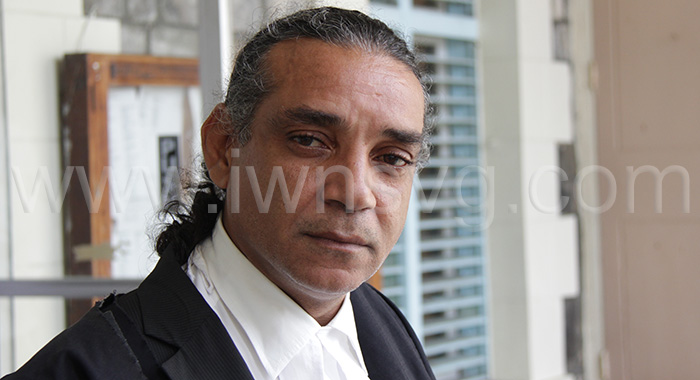
‘spilling your guts’
He said it was not normal for a defendant to request an interview with the police.
“In Vincy there is a saying that I like, speaking about ‘spilling your guts’, ‘spilling your belly’.
“He had something in his stomach that he needed to get out. Something in his heart, something on his mind. He requested to give the interview to the police, which he did.”
The prosecutor said that a justice of the peace was present at all material times when Douglas visited the scene and pointed out things to the police.
The prosecutor said that sometimes, it might be difficult for a single strand of thread to hold on a button, but when multiple strands are strung together, it becomes strong enough.
“And the multiple strands that the prosecution has presented are certainly strong enough to carry the prosecution’s case beyond a reasonable doubt.”
He said that the reasons the jury can be sure that Douglas and Dunbar committed the murders, are that they had motive, in that Francis wanted to get rid of Danroy, having concluded that it was cheaper to pay an assassin than to pay him for the damage to the vehicle.
Maitland said there was swift action by reputable police officers, who apprehended the men the same day.
At 12:40 p.m., there was an anonymous call to the police about the bodies being discovered. Dunbar and Douglas were arrested at the same place at Rillan Hill a few hours later.
He said it is important to note that when the police arrived, Douglas did not throw himself at the mercy of the police and say he was afraid of Dunbar and, therefore, had acted under duress.
“He attempted to walk away from the police,” Maitland said, adding that Douglas had ample opportunities when he was not close to Dunbar to inform the police, if he had acted out of fear.
“Hoodie had knowledge of the plan, he stuck with Jacket and Richard, he stayed even after he knew that the two deceased men were being lured to their deaths. He stayed even though he claims he wasn’t going to get a cut for the murders.”
Maitland said that Douglas helped to dump the bodies, helped to conceal evidence and had ample opportunities when he was not near Dunbar to tell police he was under duress.
The prosecutor said Douglas helped to ensure that there was some distance between him, Dunbar and Francis, when he agreed to take Dunbar’s bloody shoes.
‘what Dunbar was not disputing’
He asked the jury to consider what Dunbar was not disputing. He did not dispute that he knew Francis before the murders but disputed that they were in communication. He did not dispute that he was met by the shop and that he had a cell phone on him. He did not dispute that a swab was taken from the cell phone, or that he had a conversation about the murders in prison.
Dunbar does not dispute that he told AB that he was paid $1,500 to kill Danroy and was to be paid another $1,500 because he ended up killing two people. He also did not dispute the statements of Francis to Inspector Browne.
“What is the value of a human life? For $1,500 and for free — Hoodie said he wasn’t paid — … Jacket and Hoodie took the lives of two young men and now wish, with the help of their counsel, to work together to help them walk free. The truth can set a man’s conscience free but the truth, in this case, may also convict and confine. These two men, who did the killing, must surely do the time,” Maitland said.




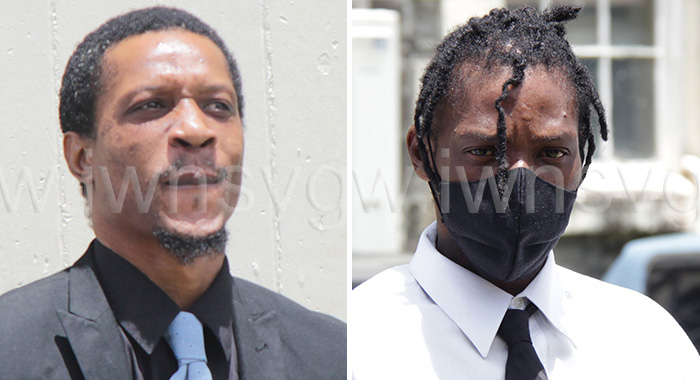


Imagine the going rate of a life in SVG is $500 – $1500!!! And sex is a meal!! we come like Haiti!!
I want to see that Dunbar on the executed f*** is he still living for how you let a man be free year after year for taking people life nah man 3 strikes your out he f*** up when the last strike took out both of my cousins they parents shouldn’t have to be paying taxes to insure they are good and eating and cared for in jail that’s a f***ing slap in our face he took our cousins away from us put that rassclat under the f***n building him and Francis them two there nah fi live frfr
Victim cousin i agree with you 100 percent the criminals deserve the death penalty. Who feels it know it. An eye for an and a tooth for a tooth. The law is soft on crimes that is why retaliation in Columbia is the norm because the law aids and abeit criminals. Two young lives were sucked out for no good reason.
Where are all the camera located. When does a life worth $1000. They should hang all of them every one of them.
It is written, in the last days man heart will be evil and desperately wicked.
hope dem rot in hell